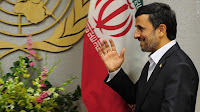 |
| Iranian President Mahmoud Ahmadinejad |
Since 2011 France has halt any imports of Iranian oil and along with much of the world has been a supporter of the economic sanctions against Iran to convince the Iranian government to halt their nuclear program pursuits. Israel has been very strongly against the progression of this nuclear program and calls for swift action, potentially military action in the form of a pre-emptive strike.
At home, the United States is rather unwilling to take military action after the long drawn out conflict in the bordering nation of Iraq. According to a poll by CNN, 60% of Americans prefer diplomatic action, and another 22% prefer to completely ignore the issue. That is over 80% of the people, a very high majority. The strains and hardship of the Iraqi conflict are less than desired to be repeated so it would seem.
What I believe is a very important detail that is being overlooked in this potential conflict is the shifting of power influence. For much of the 20th century, as well as for many centuries prior, European influence has dominated the majority of foreign policy. In this specific case, that power has shifted most notably to China and the East. Iran exports 70% of its oil to Asia, a majority of which goes to China. Being that the majority of the Iranian government's revenue is comprised of oil revenues, more than 50%, the likelihood of Europeans being able to hit Iran in the pocketbook, if you will, is significantly lessoned. No matter how hard the economy affects Iranian citizens. As China and Russia showed with their veto vote in the U.N. resolution to condem the Syrian Government, Iranian oil will likely not be stopped by these powers, and to further the influence of changing directions is unlikely.
Does this mean the U.S. and Europe are going to be unable to halt the nuclear pursuits of Iran? Likely it will not, but it will make it more challenging, especially as Iran tries to divide the E.U. between those who rely on Iranian oil and those who do not. All during a time of the E.U. and German Chancellor Angela Merkel asking for Chinese capital to aid in the European financial crisis.
Iran has found a way to influence and distract the world from solving the issues in Europe. To me it is just one more example of their desire to be a menace of global political stability.
For more, read this article from the NY Times .
Hey Jeff, I'm one of Megan's friends from home. I'm studying poli sci at ND, and thought I'd link to a pair of articles you might find interesting with regard to your post.
ReplyDeleteIsrael/Iran
Taken from Foreign Affairs
Israel/US/Iran
AP (typically they have terrible writing, but still an interesting article)